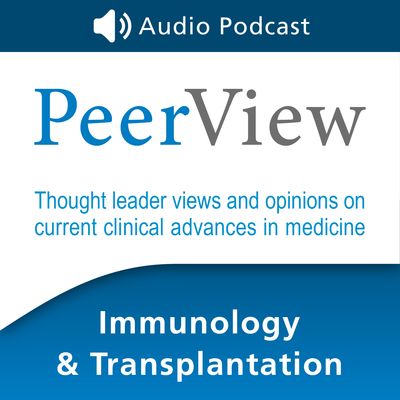PeerView (PVI) is a leading provider of high-quality, innovative continuing education (CME/CE/CPE and MOC) for clinicians and their interprofessional teams. Combining evidence-based medicine and instructional expertise, PeerView activities improve the knowledge, skills, and strategies that support clinical performance and patient outcomes. PeerView makes its educational programming and expert-led presentations and symposia available through its network of popular podcast channels to support specific specialties and conditions. Each episode includes a link to request CME/CE credit for participation. PeerView is solely responsible for the selection of topics, the preparation of editorial content, and the distribution of all materials it publishes.
http://ww2.peerview.com
Gail J. Roboz, MD - Maintaining “Intensity” for Better Outcomes in AML: Guidance on Modern, Intensive Upfront Platforms in Challenging Patient Populations
Go online to PeerView.com/BMM860 to view the activity, download slides and practice aids, and complete the post-test to earn credit. [Robust clinical evidence has proven that more effective upfront treatment platforms based on novel cytotoxics and targeted agents are now available for acute myeloid leukemia (AML)—including for difficult-to-treat subtypes (eg, secondary AML, mutation-defined disease). These new options have been shown to extend survival and, importantly, to allow more patients to reach hematopoietic stem cell transplant (HCT), a potentially curative treatment. Is a new ‘intensive’ treatment strategy forming in the context of modern AML care? Find out in this activity, based on a recent live symposium, and watch as an expert panel uses case-based conversations linked to the latest evidence on intensive upfront treatments to flesh out diagnostic strategies to capture challenging AML subtypes (including those with secondary AML or mutation-defined disease), determine the eligibility of patients for intensive therapeutic platforms, and select personalized upfront regimens with a goal of achieving robust remissions. Upon completion of this activity, participants should be better able to: Cite the diagnostic, prognostic, and therapeutic implications of baseline factors (eg, age, genetic/molecular features, functional status) for challenging AML subtypes—including secondary AML, mutation-defined disease, and higher-risk disease; Summarize current evidence on novel upfront induction/consolidation regimens for use in diverse AML settings; Recommend evidence-based, personalized upfront treatment platforms for patients with challenging AML subtypes, including those eligible for HCT; and Manage unique safety considerations associated with novel upfront treatment platforms, including innovative cytotoxic and targeted regimens
